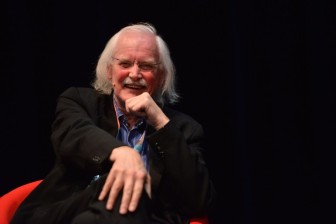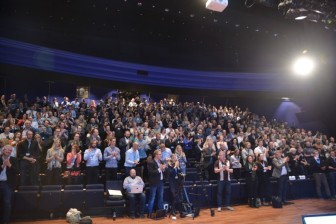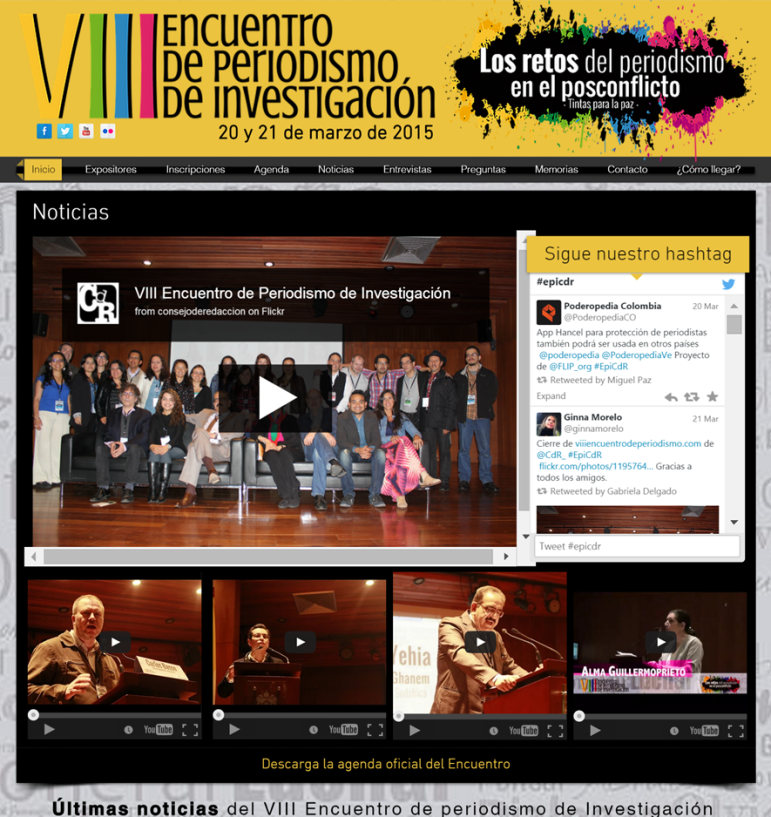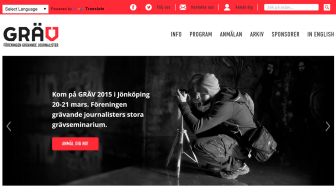
SKUP15 Keynoter Charlie Hebdo cartoonist Bernhard Willem Holtrop, best known as “Willem.”
(Tonsberg, Norway) From an international film festival in London to bustling conferences in Scandinavia and Latin America, investigative journalists turned out by the hundreds over the weekend in search of training and inspiration. The events, sponsored by GIJN member organizations in four countries, are part of an increasingly crowded calendar sparked by the growing global practice of investigative journalism.

Holtrop received an enthusiastic standing ovation from SKUP15. Credit: Marius Nyheim Kristoffersen/SKUP
The various conferences attracted more than a thousand journalists to seminars on watchdog reporting, data analysis, documentaries, conflict reporting, and more. Over 540 journalists from a dozen countries gathered in Norway’s oldest city of Tonsberg for the annual meeting of SKUP (#SKUP2015), the Association for Critical and Investigative Journalism. Across the border, in the southern Swedish city of Jönköping, more than 600 journalists from 25 countries came to the annual conference of Föreningen Grävande Journalisters (#GRAV15), Sweden’s Association of Investigative Journalists. And 9,000 kilometers away in Bogota, Colombia, another 210 journalists from 8 countries gathered for the yearly conference of Consejo de Redaccion (#EpiCdR), that country’s investigative journalism association. Meanwhile, in London, The Centre for Investigative Journalism hosted its annual Investigative Film Festival (#CIJFF15).
“The gatherings and events this weekend demonstrate the vitality and growth of investigative journalism globally,” says Brant Houston, chair of the GIJN board of directors. “Despite attacks and threats, determined and courageous reporters and editors continue to expose corruption and keep those in power accountable. And the number of those investigative journalists is increasing.”
Heavy Security

SWAT teams and dog sniffers: heavily armed Norwegian police guarding the entrance of the SKUP conference.
Headliners at Norway’s SKUP conference included Bernhard Willem Holtrop, a surviving cartoonist from the Charlie Hebdo terrorist attack. Norway’s prime minister, Erna Solberg, also made a surprise appearance and poked fun at the press and her colleagues in politics, reminding attendees of American presidents joking at the White House Correspondents Dinner.
The high-profile guests added to an atmosphere already infused with unprecedented security for an investigative journalism event. The conference hotel was cordoned off by police with automatic weapons, who ran ID checks and deployed bomb-sniffing dogs and a SWAT team to the roof. The measures were taken in the aftermath of the January 7 terrorist attack on Charlie Hebdo magazine in Paris, followed five weeks later by a deadly shooting at a free speech event in Copenhagen.
A terrorist attack is not an abstract threat for SKUP. Before murdering 67 people at a youth camp, far-rightist Anders Behring Breivik plotted to attack the journalism group’s 2011 conference.
Security was also obvious at the Swedish conference, which included both uniformed and plainclothes police, attendees reported.
“There’s a serious risk of terrorists operating in a team to hit soft targets,” says SKUP Board Chair Jan Gunnar Furuly. He and other SKUP leaders consulted closely with Norwegian police prior to the conference after authorities raised the country’s threat level and advised the nation’s media they are a likely target.
The unusual security may be a warning to other journalism groups. “A place with 540 prominent journalists and information activists could get hit,” Furuly explains. “It’s common sense to have a security plan. Journalists have never been targeted as they are today.”
Geolocators, ISIS, and Ebola
The Scandinavian conferences featured data training and useful tech tools, such as a geolocator to track people through their posted images; panels on undercover tactics, following money, and cross-border reporting; and forums on Russia’s new propaganda war, ebola, and ISIS. SKUP tried out a number of sessions with an eye to its hosting the Global Investigative Journalism Conference on October 8-11 this year.
 The meeting in Bogota, meanwhile, brought together Colombia’s lively investigative journalism community once again, this time focused on the topic of Challenges of Journalism in Post-Conflict Societies. Among the areas covered:
The meeting in Bogota, meanwhile, brought together Colombia’s lively investigative journalism community once again, this time focused on the topic of Challenges of Journalism in Post-Conflict Societies. Among the areas covered:
- La Isla, a documentary which has changed the historical debate in Guatemala, based on the recovery of millions of once-secret papers on that country’s dirty war;
- How to cover the narcotics industry, by Oscar Martinez of El Salvador’s El Faro, a winner of last year’s Latin American Investigative Journalism Award;
- A keynote address by Bruce Shapiro of the Dart Center for Journalism and Trauma, on the emotional and professional toll borne by journalists covering violence and conflict;
- A look into Chequeado, Latin America’s first fact-checking site.
 Impressive Awards
Impressive Awards
The conferences gave out awards honoring the year’s best investigative work. Noway’s top prize went to Kristoffer Egeberg of Dagbladets, a top tabloid daily, for Nigeria Boats. The story tracked down how at least ten Norwegian naval vessels were wrongly sold off to notorious warlords and paramilitary companies in West Africa. Sweden’s Golden Shovel awards went to an array of stories on police accountability, psychiatric care, home health care, and child labor. (More on the awards later this week on gijn.org.)
Investigative Film Fest
In London, the Centre for Investigative Journalism, in association with Westminster University, showcased five films, two of them UK premieres. Here’s a look at the schedule:
 Chemical Weapons: Made in Europe: This documentary by 28-year-old French investigative journalist Jean-Baptiste Renaud reveals how President Bashar al-Assad of Syria, the Al-Khalifa regime in Bahrain, and former Iraqi leader Saddam Hussein were able to both buy and make weapons prohibited by the international community.
Chemical Weapons: Made in Europe: This documentary by 28-year-old French investigative journalist Jean-Baptiste Renaud reveals how President Bashar al-Assad of Syria, the Al-Khalifa regime in Bahrain, and former Iraqi leader Saddam Hussein were able to both buy and make weapons prohibited by the international community.
 The Black Boxes and TeliaSonera: These two documentaries, produced by the powerhouse team at Swedish Public Broadcasting, are an investigation into the Swedish/Finnish telco TeliaSonera and its cooperation with dictatorships in countries like Uzbekistan and Belarus, where the company is a dominant player in the mobile telephony market.
The Black Boxes and TeliaSonera: These two documentaries, produced by the powerhouse team at Swedish Public Broadcasting, are an investigation into the Swedish/Finnish telco TeliaSonera and its cooperation with dictatorships in countries like Uzbekistan and Belarus, where the company is a dominant player in the mobile telephony market.
 Burn: When Mark Duggan was shot by British police the scene was set for a confrontation, but this was not the first time. Powerful witness testimonies are balanced against police reaction to the violence that exploded and the film offers a fresh political analysis of the cause of the rioting. By veteran filmmaker and activist Ken Fero.
Burn: When Mark Duggan was shot by British police the scene was set for a confrontation, but this was not the first time. Powerful witness testimonies are balanced against police reaction to the violence that exploded and the film offers a fresh political analysis of the cause of the rioting. By veteran filmmaker and activist Ken Fero.
 Informants: This 48-minute documentary takes viewers inside the shadowy world of U.S. counterterrorism sting operations. Informants tells the stories of three paid FBI informants who posed as Muslims as they searched for people interested in joining violent plots concocted by the FBI.
Informants: This 48-minute documentary takes viewers inside the shadowy world of U.S. counterterrorism sting operations. Informants tells the stories of three paid FBI informants who posed as Muslims as they searched for people interested in joining violent plots concocted by the FBI.
 Fire in the Blood: An intricate tale of ‘medicine, monopoly and malice,” Fire in the Blood tells how Western pharmaceutical companies and governments aggressively blocked access to low-cost AIDS drugs for the global south — causing 10 million or more unnecessary deaths — and the improbable group of people who decided to fight back.
Fire in the Blood: An intricate tale of ‘medicine, monopoly and malice,” Fire in the Blood tells how Western pharmaceutical companies and governments aggressively blocked access to low-cost AIDS drugs for the global south — causing 10 million or more unnecessary deaths — and the improbable group of people who decided to fight back.
For upcoming events, be sure to check the GIJN Calendar, the most comprehensive list of investigative journalism events around the world. Have a listing? Send it to us at hello@gijn.org.

